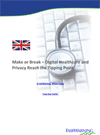
Electronic healthcare is a liberating force for clinicians, healthcare providers and patients. It promises better care, delivered faster, with greater safety and improved outcomes. But there are dangers. Unless patient privacy is built into NHS IT systems at ground level there is the ever-present risk of major data breaches.
The greatest threat is not from lost or stolen laptops and mobile devices, but from staff abusing their legitimate access rights to read electronic records they have no right to see. This can lead to identity theft, fraud and many other forms of criminality. Details of celebrity patients can also be leaked to the media.
Improper accessing of patient records is widespread in the UK and worldwide. It can result in immense harm to the reputation of hospitals, their senior management and their clinicians and cause irreparable damage to patients and their families. Equally it can undermine the trust of patients, and the wider public, in the specific organisation and more generally in electronic health records.
This paper is the result of detailed research and global customer experience around privacy breach detection. It also includes extensive input from respected experts in UK healthcare and privacy regulation. Overall it provides an analysis of the problem and guidance on the way forward.
Download: Make or Break - Digital Healthcare and Privacy Reach the Tipping Point (.pdf, 1.073 KB).
Download from eHealthNews.eu Portal's mirror: Make or Break - Digital Healthcare and Privacy Reach the Tipping Point (.pdf, 1.073 KB).
Related news article:
- How Privacy Considerations Drive Patient Decisions and Impact Patient Care Outcomes (white Paper)
- Future of Electronic Healthcare Reaches Tipping Point